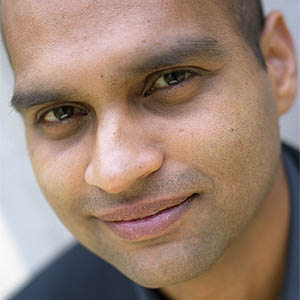Aravind Adiga wins Booker for tale of two Indias
 Washington - Nothing prepares you for Aravind Adiga's India - a deep, oozing, festering sore that you are desperate to ignore, but one that he forces you to stare at, and later laugh about.
Washington - Nothing prepares you for Aravind Adiga's India - a deep, oozing, festering sore that you are desperate to ignore, but one that he forces you to stare at, and later laugh about.
The White Tiger, the Indian author's debut novel about one man's unscrupulous journey from a village life of unbearable poverty to blazing entrepreneurial success was awarded the 2008 Man Booker Prize for Fiction late Tuesday in London.
Adiga described the novel as "a portrait of society that is on the brink of unrest." But it's also funny. "It's meant to get people thinking," he said.
"You expect books dealing with social issues to be boring. ... There's no reason a book dealing with poverty can't also be viciously funny at times," Adiga said in an interview with BBC Radio.
Provocative, disarmingly honest and darkly humourous, The White Tiger is the story of one of the hundreds of millions of India's teeming, faceless underclass.
Protagonist Balram Halwai is the son of a rickshaw puller who manages to break out of poverty's entrapment. But he pays a hefty price - cutting a path to success through cheating, corruption and murder.
The anti-hero narrates his life story through a series of letters to Chinese Premier Wen Jiabao, who is soon to visit Bangalore, India's information technology hub and the city where Balram now lives.
In the first letter, he writes: "Apparently, sir, you Chinese are far ahead of us in every respect, except that you don't have entrepreneurs.
"And our nation, though it has no drinking water, electricity, sewage system, public transportation, sense of hygiene, discipline, courtesy or punctuality, does have entrepreneurs. Thousands and thousands of them. And these entrepreneurs ... have set up all these outsourcing companies that virtually run America now."
In the real world - not far removed from Balram's - as the global financial crisis continues to unravel, India's economic growth is expected to dip from 8 per cent this year, to 7 per cent in 2009, which is still a strong growth rate. But millions in the world's second-most populace country eke out an existence in extreme poverty.
The 2008 Global Hunger Index, also released Tuesday, said that India has the largest number of people living in hunger in the world - an astounding 200 million. Despite its economic successes, India scored worse on the hunger index than nearly 25 sub-Saharan African countries and all of South Asia, except Bangladesh.
While Adiga said that his novel was neither political nor made a social statement, he added: "I'm increasingly convinced that the servant-master system, the bedrock of middle class Indian life, is coming apart - and it's unravelling will lead to greater crime and instability."
Balram writes to Wen that he admires China because it never let itself be ruled by another nation.
"Out of respect for the love of liberty shown by the Chinese people, and also in the belief that the future of the world lies with the yellow man and the brown man ... I offer to tell you, free of charge, the truth about Bangalore."
His truth reveals an India that few can imagine.
"Balram teaches us that religion doesn't create virtue, and money doesn't solve every problem - but decency can still be found in a corrupt world, and you can get what you want out of life if you eavesdrop on the right conversation," as the book jacket puts it.
Adiga, a 33-year-old journalist who lives in Mumbai, manages to effectively tell the "story of two Indias" in his book, which was praised by Booker Prize judges' chairman Michael Portillo as "being in the tradition of Macbeth with a delicious twist."
Announcing the prize, Portillo commented: "The White Tiger prevailed because the judges felt that it shocked and entertained in equal measure. ... The book gains from dealing with pressing social issues and significant global developments with astonishing humour."
Adiga is the third first-time novelist to win the 50,000-pound (86,000 dollar) Booker, currently in its 40th year. Previous debut winners were Arundhati Roy in 1997 for God of Small Things and DBC Pierre in 2003 for Vernon God Little.
He is the fourth Indian-born author to win the prize, joining Salman Rushdie, Roy and Kiran Desai. A fifth winner, Trinidad-born VS Naipaul, is of Indian descent.
Adiga doesn't expect life to change much. Soon after he made it to the Booker long list, he said he was thrilled, but that he still travelled by Mumbai's overpacked, suffocating commuter trains and worried about falling ill from unsafe drinking water.
"Life," he said, "goes on as before." (dpa)